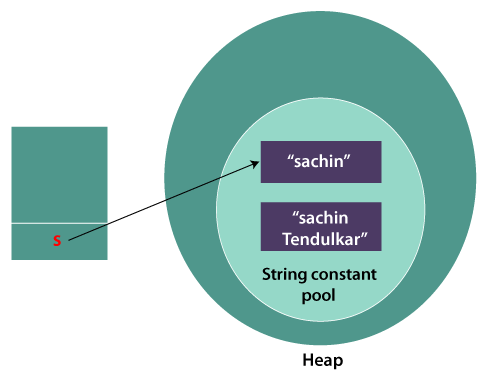Why Are Strings Immutable in Java? Trick Factors and Advantages Explained
Why Are Strings Immutable in Java? Trick Factors and Advantages Explained
Blog Article
Exploring the Benefits of Unalterable Strings in Modern Programming Paradigms
In the realm of contemporary programs paradigms, the idea of immutable strings stands as a foundation of robust software application growth. By embracing immutable strings, developers can guarantee improved data integrity, enhanced thread security, simplified debugging procedures, enhanced security measures, and efficient efficiency optimization.
Improved Information Stability

By stopping the adjustment of string things, immutability eliminates the threat of unintended modifications to the information they hold. This not just boosts the protection of the information yet also boosts the dependability of the code that counts on these strings.
Immutability additionally sustains much safer multithreading environments, as simultaneous accessibility to immutable strings does not posture the danger of information corruption through synchronised adjustments. This building simplifies the process of dealing with strings in identical programs situations.
Fundamentally, immutability serves as a safety shield around the information stored within strings, enhancing their stability by making certain that once specified, their values stay unmodified throughout the program's implementation.

Enhanced Thread Safety
Immutable strings improve the string safety and security of programs by ensuring that when a string item is developed, its worth can not be modified. This residential property gets rid of the risk of simultaneous threads trying to customize the exact same string simultaneously, which could lead to data corruption or irregular states in the program - Why are strings immutable in Java?. In a multi-threaded atmosphere, where several threads gain access to and manipulate data all at once, the immutability of strings gives a level of security by ensuring that the information stays unchanged throughout its lifecycle
Simplified Debugging Processes
Given the enhanced string security promoted by unalterable strings, a substantial advantage occurs in the world of streamlined debugging procedures. Immutable strings, as soon as produced, can not be modified, making it less complicated to map the flow of data and determine the source of insects in a program. This immutability ensures that strings continue to be consistent throughout the implementation of the program, minimizing the likelihood of unexpected changes that might result in mistakes.
When debugging with mutable strings, designers often experience problems where a string's value is modified unintentionally, making it testing to determine the origin of a pest. Nonetheless, with unalterable strings, the data continues to be unchanged, allowing designers to focus on analyzing the real reasoning of the code as opposed to finding where and when a string was changed incorrectly.
In addition, immutable strings streamline the debugging process by enabling much easier reproduction of bugs. Given that unalterable strings do not change state, developers can recreate and research insects more efficiently, leading to quicker identification and resolution of concerns within the codebase. This streamlined debugging process ultimately adds to greater software program top quality and boosted general development effectiveness.

Enhanced Safety And Security Actions
Enhancing data defense and fortifying system integrity, the use of unalterable strings in software applications adds significantly to enhanced safety steps. Immutable strings additionally play an essential duty in avoiding usual security vulnerabilities such as barrier overflows and SQL shot assaults, as efforts to adjust string information at runtime are inherently limited.
Furthermore, the immutability of strings improves the predictability of program behavior, making it much easier to validate inputs and stop unanticipated modifications that could endanger security. This predictability streamlines the procedure of bookkeeping and verifying code, allowing designers to identify prospective protection technicalities better. On the whole, incorporating unalterable strings into software program development methods not just boosts the effectiveness and reliability of applications but likewise enhances their durability versus safety dangers.
Efficient Efficiency Optimization
Building upon the foundation of raised safety procedures achieved via the use of immutable strings, a vital aspect to take into consideration in software program advancement is reliable performance optimization. When taking care of mutable strings, operations like concatenation or substring production frequently result in click here now the development of new string things, leading to memory expenses and raised handling time. Nevertheless, with unalterable strings, these operations can be maximized to improve efficiency. By permitting strings to stay continuous and stable, unalterable strings assist in much better memory monitoring and caching chances, ultimately boosting the general performance of the software.
Given that immutable strings can not be changed when produced, they can be shared across strings without the risk of unexpected adjustments, reducing the demand for synchronization systems and enhancing concurrency. Immutable strings simplify debugging procedures as programmers can trust that a string's value will certainly remain consistent throughout the program's implementation, getting rid of possible check my reference mistakes created by mutable state modifications.
Verdict
To conclude, the benefits of utilizing immutable strings in modern-day shows paradigms can not be overstated. Improved information honesty, improved thread safety, streamlined debugging procedures, boosted safety procedures, and reliable performance optimization all add to the total effectiveness of shows jobs. By including unalterable strings into programming practices, programmers can take advantage of a more trustworthy and durable codebase.
Immutability, a crucial feature of strings in shows languages such as Java and Python, makes sure that as soon as a string item is produced, it can not be modified or changed.Unalterable strings improve the string safety and security of programs by making certain that when a string item is developed, its worth can not be changed. Unalterable strings additionally play a crucial function in stopping common security vulnerabilities such as buffer overflows and SQL injection attacks, as attempts to control string information at runtime are naturally limited.
By enabling strings to stay continuous and unchangeable, immutable strings promote better memory management and caching possibilities, inevitably boosting the total effectiveness of the software.
Unalterable strings streamline debugging other processes as developers can rely on that a string's worth will remain constant throughout the program's implementation, getting rid of potential mistakes triggered by mutable state adjustments.
Report this page